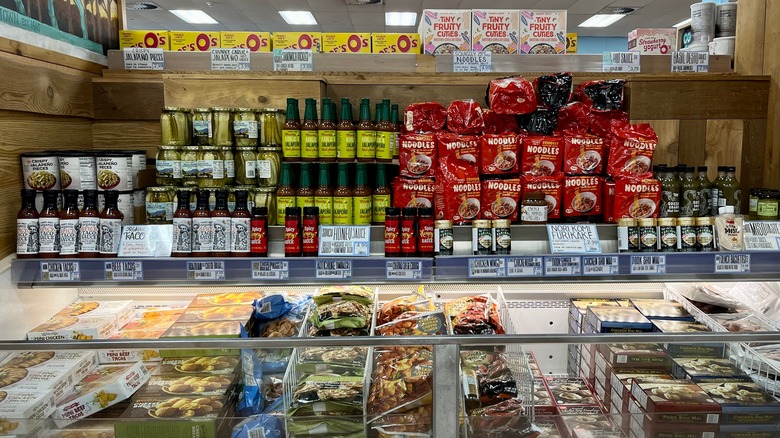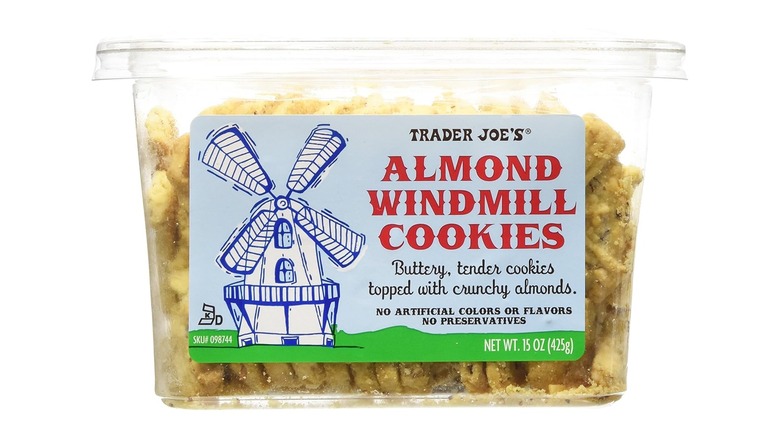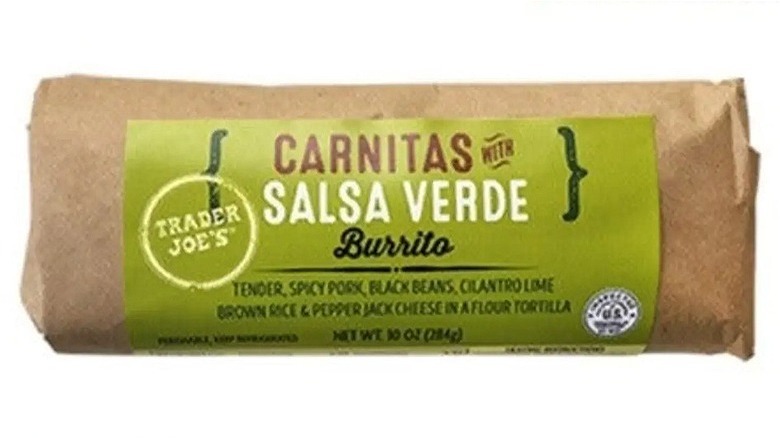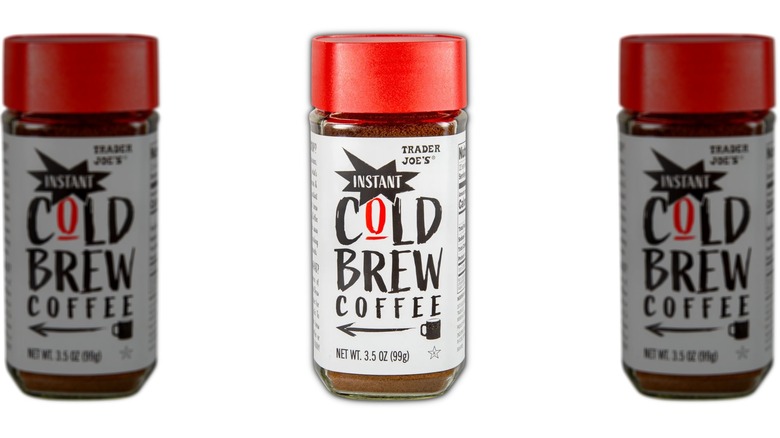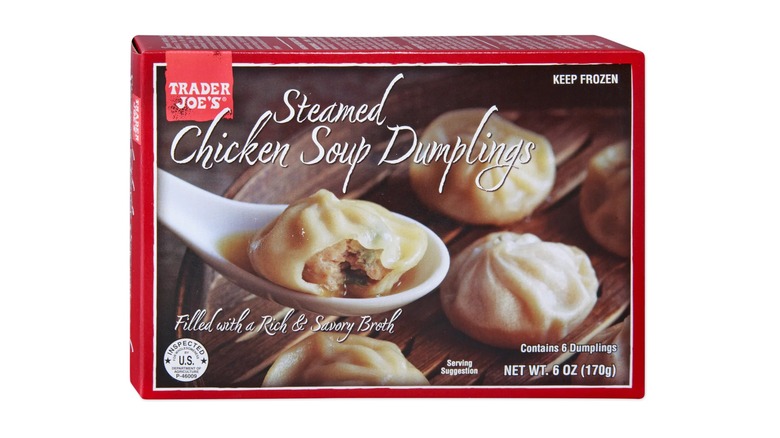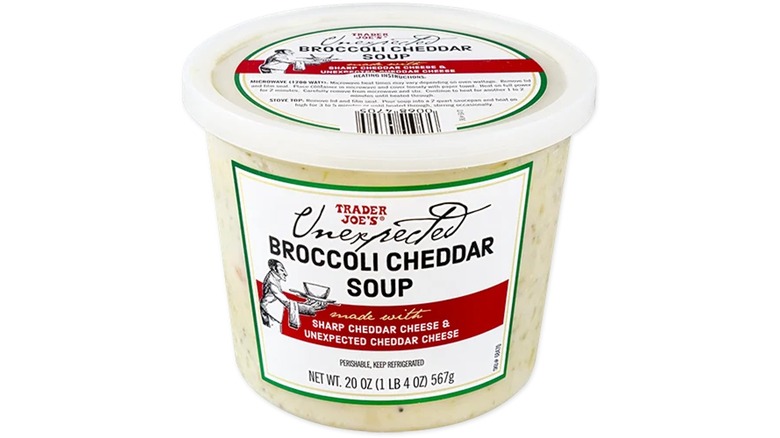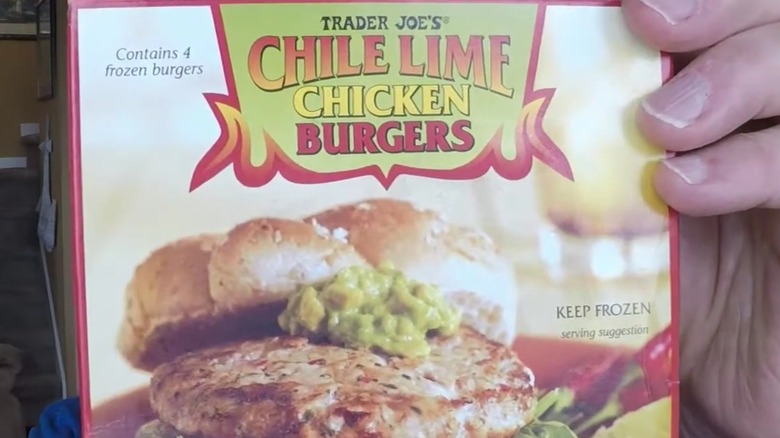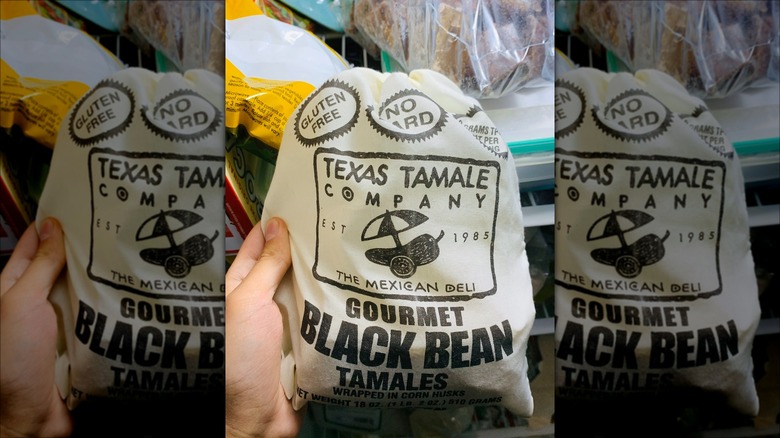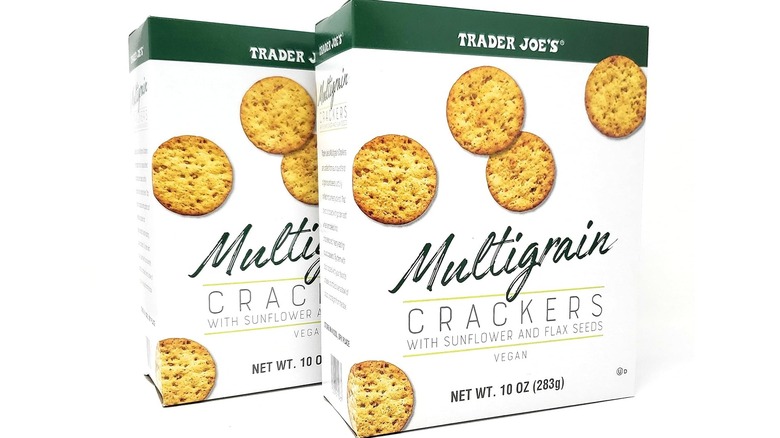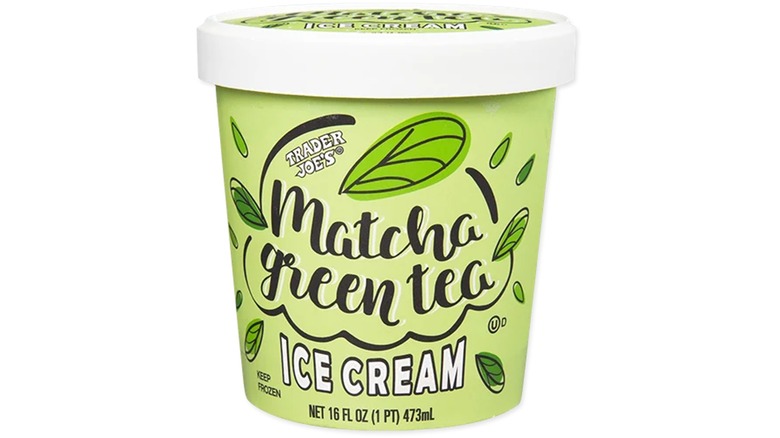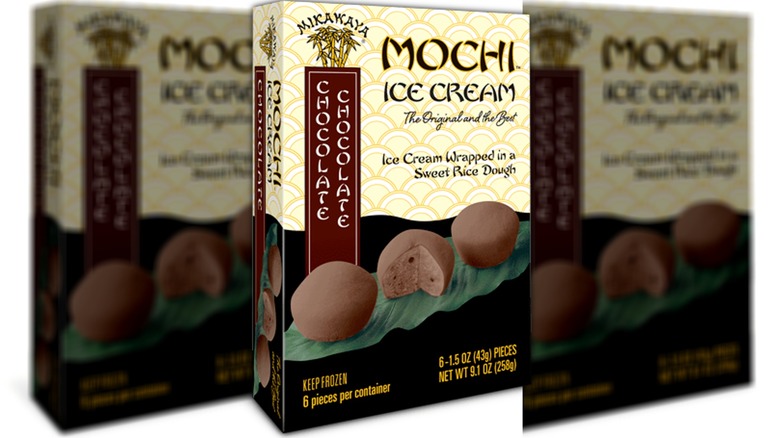13 Food Recalls That Will Always Haunt Trader Joe's
We may receive a commission on purchases made from links.
As with any grocery store brand, Trader Joe's has issued its fair share of food recalls over the years. These recalls have become so frequent that entire subreddit threads have been dedicated to analyzing them. The general feeling is that the high prevalence of recalls is concerning. This is for good reason — some of Trader Joe's recalls have been truly haunting, as the following 14 examples demonstrate.
It's important to note that Trader Joe's is not alone in recalling items. In recent years, the number of recalls across the industry has been notably high. A report by Sedgwick Brand Protection revealed that, in 2023, the industry experienced 506 recall events. Trader Joe's is especially vulnerable, due to its habit of sourcing products from numerous small manufacturers. To put it simply, the more manufacturers a grocery store brand works with, the more likely it is that some of its products will get contaminated or mislabeled.
It's rarely Trader Joe's fault that these products need recalling. Instead, the blame often lies with food manufacturers. Yet, as the company that sells the products, Trader Joe's tends to get most of the criticism. As the following food recalls highlight, this criticism is often incredibly damaging.
1. Cookies recalled because they contained rocks
Foreign objects in any product pose a serious risk to consumers. This is doubly true when that product is food and the foreign object is inedible. Trader Joe's customers were put on high alert during the summer of 2023 when the company recalled both its Almond Windmill Cookies and its Dark Chocolate Chunk and Almond Cookies after the products' supplier raised concerns that rocks might have accidentally been incorporated into the dough. Trader Joe's and the supplier both failed to provide information concerning the size of the rocks or how they ended up in the cookies.
Thankfully, there were no reports of injuries as a result of the contaminated cookies. That being said, Trader Joe's reputation for serving high quality sweet treats definitely took a hit, especially as this recall came only a year after pieces of plastic were found in snickerdoodle cookies also sold by the store. These two recalls likely put customers off Trader Joe's cookies, even the copycat Oreos the brand is famous for.
2. Basil recalled over Salmonella concerns
On April 19, 2024, the Centers for Disease Control and Prevention released a food safety alert about a salmonellosis outbreak linked with fresh basil that had been sold at Trader Joe's stores across 29 states. The basil was sourced from Infinite Herbs, a company that also supplied Fruit Center Marketplace stores in Massachusetts with the product. A total of 12 illnesses were reported as a result of the outbreak with one person requiring hospitalization. No deaths were reported.
While all foodborne illnesses pose serious risks, salmonellosis outbreaks are particularly concerning due to their prevalence. Around 1.35 million Americans contract salmonellosis every year. Of these people, around 26,500 are hospitalized and approximately 420 die.
While often associated with raw and undercooked meat, Salmonella bacteria can easily contaminate fresh produce, such as basil. These instances are particularly likely to cause salmonellosis because, unlike with meat, fresh produce is often consumed raw. This means that the Salmonella bacteria is not killed prior to being ingested, greatly increasing the chances of the bacteria making someone ill.
3. Carnitas burritos recalled due to Salmonella and Listeria fears
Ready-to-eat products pose an especially high risk of foodborne illness for the simple reason that people often don't heat them before eating. What's more, the ready-to-eat products stocked by companies such as Trader Joe's are often made with ingredients and products sourced from a number of different food manufacturers. If one of these suffers a failure in food safety, the entire product is compromised.
This was exemplified in October 2018 when Trader Joe's recalled a ready-to-eat carnitas burrito. The recall came after supplier Bakkavor Foods recalled 795,261 pounds of ready-to-eat meat. In turn, this recall occurred because Bakkavor Foods' onion supplier issued its own recall over fears an onion product had been infected with both Salmonella and Listeria monocytogenes.
Listeria monocytogenes is a bacteria that, when ingested, can cause an infection known as listeriosis. This foodborne illness is particularly harmful. Of the approximately 1,600 people who contract listeriosis every year, 260 die. Thankfully, no illnesses were reported as a result of the contaminated burritos, although this particular recall exemplifies how interlinked — and therefore vulnerable — Trader Joe's food chain is.
4. Instant coffee recalled due to contamination with glass
Many food recalls pertain to perishable goods. While these foods are likely to cause illness, they do offer one silver lining: The period when they could cause harm is limited. For example, if lettuce is infected with harmful bacteria it will only pose a risk to customers for the week or two that it is edible. Once past its best, customers will dispose of it and it'll leave the food chain altogether, ensuring customers are free from danger. Non-perishable goods are not like this. Instead of a few weeks, these products can pose a risk for months and even years. This made Trader Joe's recall of its Instant Cold Brew Coffee in May 2023 that much more alarming.
The coffee was recalled due to concerns that it contained small fragments of glass. This is especially concerning in a product that disguises these fragments well, both when the granules are in the jar and once they're dissolved in water. At the time of writing, no injuries were associated with the consumption of Trader Joe's Instant Cold Brew Coffee. The brand isn't out of the woods yet, though; some of the product does not expire until the end of 2024, meaning glass could still be consumed by unsuspecting customers.
5. Soup dumplings recalled over plastic contaminants
In March 2024, Trader Joe's issued its third recall of the year. This time, it recalled over 61,000 pounds of a steamed soup dumpling product due to concerns the food contained pieces of plastic. CJ Foods Manufacturing, the company that supplied Trader Joe's with the product, reported that the plastic was derived from a permanent marker pen. The company did not offer an explanation as to how pieces of the pen ended up in the dumplings.
Trader Joe's issued the recall after customers reported finding pieces of the plastic. It is not known if any of these people suffered injuries as a result of consuming the dumplings. Due to the dumplings being a frozen product, the recall is ongoing; the affected dumplings' best-by date is early March 2025. Unsurprisingly, Trader Joe's is encouraging shoppers to check their freezers and return or discard the product. Needless to say, this recall has done little for Trader Joe's reputation.
6. Broccoli soup recalled after being contaminated with bugs
Glass, rocks, and plastic are not things anyone wants to find in their food. But Trader Joe's most haunting food recall did not arise due to these contaminants. Instead, it came when the company announced a recall of broccoli cheddar soup after discovering it contained bugs.
According to an enforcement report by the Food and Drug Administration, these bugs were found in frozen broccoli florets included in the soup. Nearly 11,000 cases of the product were reported as being affected across seven states: Florida, Illinois, California, Texas, Washington, Pennsylvania, and Connecticut. No illnesses were reported as a result of the contaminant although many customers made their disgust known online.
Trader Joe's issued the recall on July 27, 2023. To make matters worse, this recall came two days after the brand's Almond Windmill Cookies and Dark Chocolate Chunk and Almond Cookies were recalled for containing rocks. All in all, Trader Joe's issued four recalls over a seven day period from July 21 to July 28, a dubious streak that rattled many loyal customers, putting them off favorites such as Trader Joe's excellent store-bought tomato soup.
7. Various products recalled over Listeria outbreak
Most of the aforementioned recalls have been relatively contained affairs, exclusively involving Trader Joe's or Trader Joe's and a few other retail companies. In February 2024, however, Trader Joe's was involved in a nationwide outbreak of Listeria monocytogenes and recalled four separate products as a result: Chicken Enchiladas Verde, Cilantro Salad Dressing, Elote Chopped Salad Kit, and Southwest Salad.
All of these products were recalled because they contained cotija cheese produced by Rizo-López Foods. This company recalled numerous products at this time, including sour cream, yogurt, and at least eight types of cheese which were sold via a huge number of retail brands and stores.
Unsurprisingly, this nationwide outbreak of Listeria had dire consequences. 26 people were recorded as contracting listeriosis. Of these people, 23 were hospitalized and two people died. One person suffered a pregnancy loss and two newborns contracted listeriosis as a result of the outbreak. What's more, it is thought that the number of people who fell ill as a result of this outbreak is much higher than was reported.
8. Chicken burgers recalled due to bone fragments
During 2021, Trader Joe's Chile Lime Chicken Burgers were recalled after customers found fragments of bone embedded in the patties. This recall was part of a larger one undertaken by Innovative Solutions, one of Trader Joe's suppliers, which also recalled spinach feta chicken sliders at the same time. With both the Trader Joe's product and these sliders combined, nearly 98,000 pounds of product was recalled. Just under 150,000 pounds was eventually recovered.
Several people reported that the once-popular Chile Lime Chicken Burgers were never restocked in Trader Joe's stores after the recall was issued. Aside from potentially causing the brand to discontinue a popular product, this recall also damaged customers' trust of Trader Joe's burgers in general. One person on Reddit wrote, "I can confirm there was certainly bones in [the Chile Lime Chicken Burgers]. My boyfriend and I bought a box and we both got bones and had to throw our whole dinner away. I have been super hesitant to buy any of their burgers since."
9. Cantaloupe recalled over Salmonella concerns
As with any other type of fresh produce, cantaloupe poses a significant risk when it comes to foodborne illnesses. According to a study published in Emerging Infectious Diseases, produce causes more than double the amount of foodborne illnesses as meat and poultry. Again, this is because fresh produce is often consumed unwashed and raw, meaning harmful bacteria remains alive and present on the produce itself.
The potential harm contaminated fresh produce can cause was revealed in late 2023 when cantaloupe contaminated with Salmonella was distributed to major retail brands, including both Trader Joe's and Kroger, by Sofia Produce. As a result of the outbreak, Trader Joe's recalled its cantaloupe products in Nevada and California as well as its Fresh Cut Cantaloupe Chunks and Fresh Cut Fruitful Medley, sold in 16 states.
Despite Trader Joe's and many other stores issuing prompt recalls, Sofia Produce's cantaloupe made many Americans ill. According to the Centers for Disease Control and Prevention, 407 illnesses were recorded across 44 states with 158 people requiring hospitalization. A total of 6 people died as a consequence of contracting salmonellosis.
10. Mislabeled tamales recalled
So far, we have focused on recalls that have arisen due to products being contaminated with foreign and inedible objects or potentially harmful bacteria. There is, however, another reason why products need to be recalled: mislabeling. A food's allergy information must be accurate to ensure customers can make informed choices about whether to eat a product or not. Package a food with incorrect labeling and the risk of someone suffering an allergic reaction skyrockets.
In August 2023, Trader Joe's issued a recall for Texas Tamale Company Gourmet Black Bean Tamales that'd been sold in stores across Alabama, Arkansas, Colorado, Kansas, Louisiana, New Mexico, Oklahoma, Tennessee, and Texas. These tamales were recalled because they contained milk, an allergen which was not listed on the ingredients list. This happened to be the sixth recall Trader Joe's had issued in less than a six week period.
Those with severe milk allergies can suffer from anaphylaxis, a life-threatening reaction, if they ingest the food. Thankfully, no illnesses or deaths were reported as a result of the mislabeled tamales. A lucky escape for both Trader Joe's and its customers.
11. Metal contaminants caused crackers to be recalled
Metal is yet another foreign object that's caused a Trader Joe's product to be recalled. In this instance, it was the brand's Multigrain Crackers with Sunflower and Flax Seeds which were recalled by supplier Treehouse Foods in August 2023. Approximately 13,000 cases were recalled after the pieces of metal were found. Neither Treehouse Foods nor Trader Joe's gave any explanation as to how metal pieces ended up in the product.
Unsurprisingly, Trader Joe's clientele was not impressed by the recall, especially as it was one of four that happened in quick succession. One individual expressed their feelings on a post on Reddit, writing, "The fact that TJ's is having recalls across so many different product categories tells me they have a system wide issue with how they manage supplier quality/safety. I have lost my confidence in TJ's quality for the time being and am going to stop shopping there. Sucks because I love their products!"
13. Ice cream recalled due to metal contaminants
There's never a good time to issue a product recall, but recalling a popular ice cream product just as summer arrives is about as bad as you can get. This is exactly what Trader Joe's was forced to do in 2017 when metal was found in its Matcha Green Tea Ice Cream. It was not reported how the metal ended up in the ice cream, although it's likely that it was due to a manufacturing fault.
After pulling the product from the shelves and advising customers who bought it to either return the ice cream or discard it, Trader Joe's was pleased to report that no injuries had been associated with the ice cream. That being said, the recall was still damaging for the brand in that it put many customers off what was a very popular product right when demand for it was rising.
14. Mislabeled mochi ice cream recalled
One month prior to Trader Joe's Matcha Green Tea Ice Cream being recalled, another frozen treat was also recalled. In this instance, the grocery store recalled Mikawaya Chocolate Mochi Ice Cream because the product might've contained peanuts, despite the allergen not being mentioned on the product's label. It's thought this was due to the accidental contamination of the mochi ice cream.
Of course, unknowingly consuming peanuts can have dramatic consequences for those who suffer from peanut allergies. In the worst case scenario, eating such ice cream could result in a person having difficulty breathing, suffering from anaphylaxis, and even dying. Mild reactions can lead to swelling, itchiness, tingling, and vomiting. Mikawaya issued the recall after a customer discovered traces of peanut butter in the product. Thankfully no injuries, reactions, illnesses, or deaths were reported as a result of people consuming the mochi ice cream.
